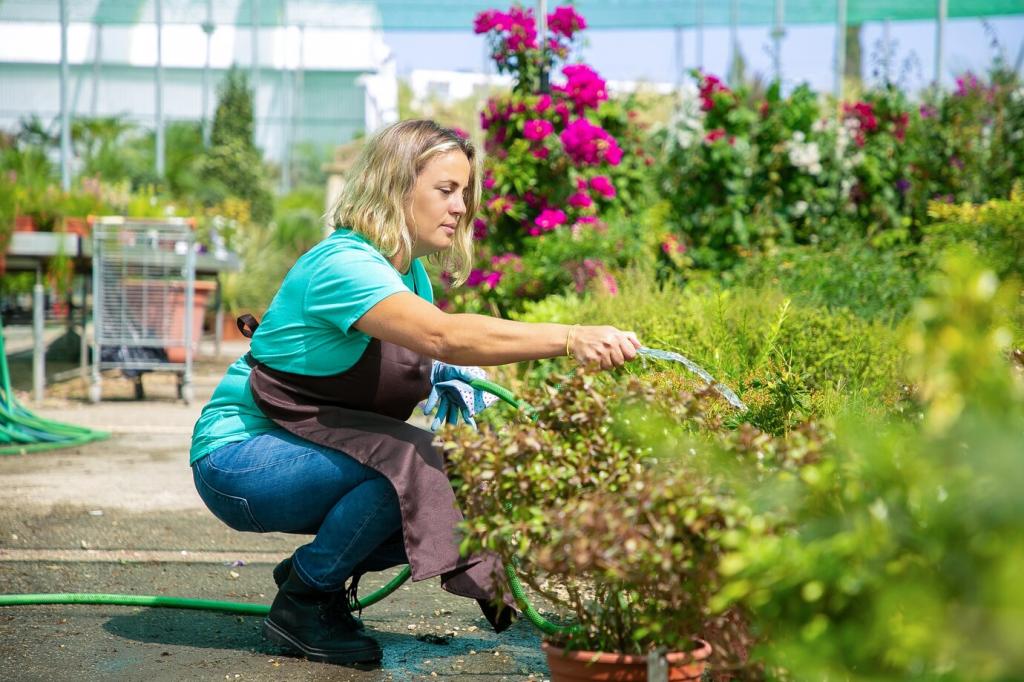DIY Vertical Gardens for Small Spaces
Chosen theme: DIY Vertical Gardens for Small Spaces. Build a lush, skyward oasis even in a studio, balcony, or rented nook. We will guide you with practical steps, charming stories, and clever hacks to grow more in less space.
Start Smart: Reading Your Small Space
Find the Right Wall or Corner
Measure height, width, and any obstructions like outlets, vents, or door swings. Tap the wall to locate studs, and note how people move nearby. Avoid high-traffic bump zones and select a surface that can safely bear distributed weight.
Sunlight, Shade, and Microclimate
Track light for one full day, noting direct sun hours and reflected glare from windows. Warm pockets near appliances or cold drafts from doors matter. Comment with your room orientation, and we will suggest plant matches.
Renter-Friendly Safety Checks
If you rent, choose damage-minimizing anchors, tension poles, or free-standing frames. Always protect paint with pads and waterproof barriers. Ask your landlord early, and subscribe for our printable permission template and safety checklist.
Structures That Work: From Pallets to Pocket Planters
Choosing Frames and Modules
Consider modular panels, shoe-pocket planters, pallet frames, or wire grids with pots. Modular systems allow easy rearrangement and plant swaps. Share your favorite look below, and we will suggest compatible plant families.


Waterproofing and Weight Management
Line the back with pond liner or thick plastic to shield paint. Use lightweight mixes with perlite or coco coir. Distribute weight across multiple anchors, and never overload a single point, especially in older buildings.
Plants That Thrive Upward
Herbs for Small Vertical Gardens
Try thyme, oregano, mint in a contained pocket, and chives for quick snips. Basil enjoys warmth and steady moisture. Tell us your light hours, and we will reply with a personalized herb lineup that fits your wall.
Edibles and Ornamentals Together
Mix cut-and-come-again lettuces with violas, strawberries, and trailing nasturtiums. Edible flowers double as garnish and pollinator bait. Post a photo of your mix, and tag your favorite harvest moment to inspire others.
Companion Planting, Vertical Edition
Pair moisture-loving greens near drip lines, drought-tolerant succulents higher up, and pest-deterring marigolds on edges. Diversity discourages pests and balances water. Subscribe for our seasonal companion map tailored to tiny spaces.
Watering Without the Mess
Use a gravity-fed drip line with adjustable emitters for even moisture. Wicking from a reservoir reduces weekday chores. Share your schedule below, and we will recommend a setup matching your routine and wall height.


Watering Without the Mess
Blend coco coir, compost, and perlite for a light, absorbent medium. Feed lightly with liquid seaweed or balanced fertilizer. Keep notes on plant response, and subscribe for our printable maintenance log to track progress.
Design Magic: Texture, Color, and Rhythm
Repeat planters or colors in odd-number groupings to create rhythm. Use trailing plants to soften edges and upright forms for structure. Comment with your favorite palette, and we will propose a simple, cohesive plan.
Design Magic: Texture, Color, and Rhythm
Maya turned a gloomy alcove into a fragrant wall of basil, strawberries, and ferns. Her secret: consistent spacing and a tiny grow light bar. Share your before-and-after, and we might feature your project in our newsletter.
Design Magic: Texture, Color, and Rhythm
Swap annual herbs or accent flowers each season, keeping perennials anchored. Rotate planters for even light exposure. Subscribe for quarterly plant swap lists designed for compact vertical gardens and microclimates.

Troubleshooting: Light, Pests, and Common Pitfalls
Inspect weekly for aphids, fungus gnats, or mites. Improve airflow, water in the morning, and clean leaves with a damp cloth. Ask in the comments about your symptoms, and we will suggest targeted, low-tox solutions.
